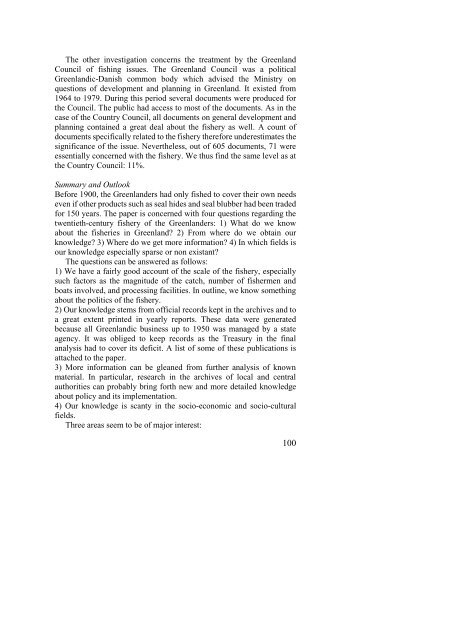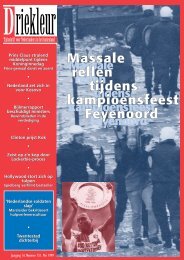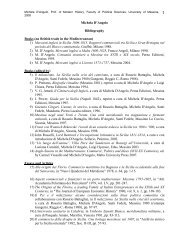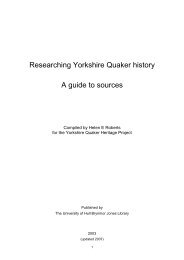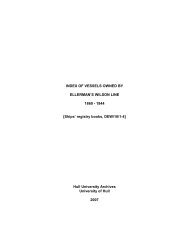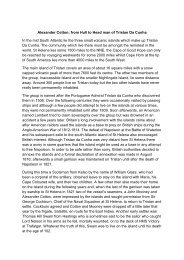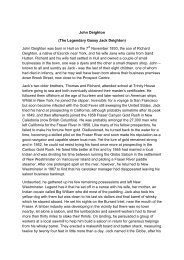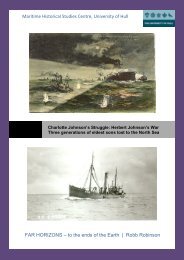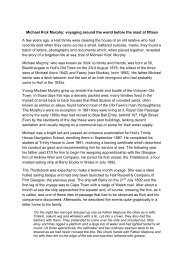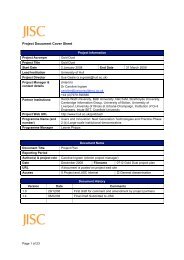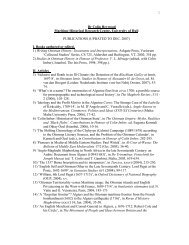The North Atlantic Fisheries, 1100-1976 - University of Hull
The North Atlantic Fisheries, 1100-1976 - University of Hull
The North Atlantic Fisheries, 1100-1976 - University of Hull
You also want an ePaper? Increase the reach of your titles
YUMPU automatically turns print PDFs into web optimized ePapers that Google loves.
<strong>The</strong> other investigation concerns the treatment by the Greenland<br />
Council <strong>of</strong> fishing issues. <strong>The</strong> Greenland Council was a political<br />
Greenlandic-Danish common body which advised the Ministry on<br />
questions <strong>of</strong> development and planning in Greenland. It existed from<br />
1964 to 1979. During this period several documents were produced for<br />
the Council. <strong>The</strong> public had access to most <strong>of</strong> the documents. As in the<br />
case <strong>of</strong> the Country Council, all documents on general development and<br />
planning contained a great deal about the fishery as well. A count <strong>of</strong><br />
documents specifically related to the fishery therefore underestimates the<br />
significance <strong>of</strong> the issue. Nevertheless, out <strong>of</strong> 605 documents, 71 were<br />
essentially concerned with the fishery. We thus find the same level as at<br />
the Country Council: 11%.<br />
Summary and Outlook<br />
Before 1900, the Greenlanders had only fished to cover their own needs<br />
even if other products such as seal hides and seal blubber had been traded<br />
for 150 years. <strong>The</strong> paper is concerned with four questions regarding the<br />
twentieth-century fishery <strong>of</strong> the Greenlanders: 1) What do we know<br />
about the fisheries in Greenland? 2) From where do we obtain our<br />
knowledge? 3) Where do we get more information? 4) In which fields is<br />
our knowledge especially sparse or non existant?<br />
<strong>The</strong> questions can be answered as follows:<br />
1) We have a fairly good account <strong>of</strong> the scale <strong>of</strong> the fishery, especially<br />
such factors as the magnitude <strong>of</strong> the catch, number <strong>of</strong> fishermen and<br />
boats involved, and processing facilities. In outline, we know something<br />
about the politics <strong>of</strong> the fishery.<br />
2) Our knowledge stems from <strong>of</strong>ficial records kept in the archives and to<br />
a great extent printed in yearly reports. <strong>The</strong>se data were generated<br />
because all Greenlandic business up to 1950 was managed by a state<br />
agency. It was obliged to keep records as the Treasury in the final<br />
analysis had to cover its deficit. A list <strong>of</strong> some <strong>of</strong> these publications is<br />
attached to the paper.<br />
3) More information can be gleaned from further analysis <strong>of</strong> known<br />
material. In particular, research in the archives <strong>of</strong> local and central<br />
authorities can probably bring forth new and more detailed knowledge<br />
about policy and its implementation.<br />
4) Our knowledge is scanty in the socio-economic and socio-cultural<br />
fields.<br />
Three areas seem to be <strong>of</strong> major interest:<br />
100


